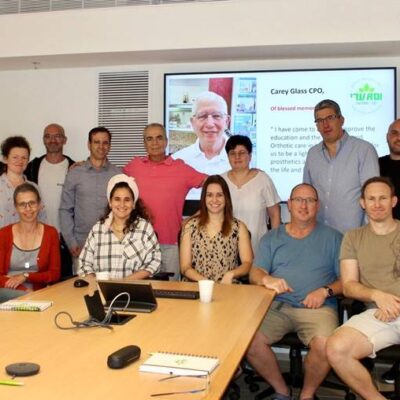Opinion
The Look on his Face was the Data We Needed

By Sara Shapiro-Plevan and Rabbi Rebecca W. Sirbu
All of a sudden, one of the men in the room let out a loud “Oh wow.” Looking at the job description in his hand, he repeated, “Wow! This says ‘Qualifications.’ In fact, all of these three job descriptions say that. I have never seen that on a job posting before. I always thought they said ‘Recommendations.’ I have never let a skills list hold me back from applying for anything. I always saw this as ‘recommendations.’” An entire room of Gender Equity Advocates in training nervously laughed, as we recognized the power in this revelation.
One of the greatest roadblocks to women’s leadership and their ability to rise into senior positions in the workplace is the way that women and men differ in their interpretation and reading of job descriptions, and the ramifications that stem from that reading. Endless sources, originally drawn from a Hewlett Packard internal report circa 2012, indicate that men and women apply for jobs differently: men are willing to apply when they meet only 60% of the qualifications, but women apply only if they meet 100% of those same qualifications. Sheryl Sandberg, Amy Cuddy, Tara Mohr, and Grace Killlea have contributed to this flood of research. We too know this clearly: this has become a powerful rationale for our work with the Gender Equity in Hiring Project, as we work across the Jewish community to remove gender bias from hiring processes in Jewish organizational life to help women rise to positions of leadership. We believe that our work is to support organizations to make these shifts, and to train them to recognize, acknowledge and release biases and change their internal processes in order to change the reality for women on the ground, inside their organizations, and across our Jewish community.
Let’s tackle the linguistic difference between qualifications, requirements (another term often used interchangeably with “qualifications”), and desired or recommended skills. “Qualified” and “required” assumes that without this, an employee would not be able to do the work, either by law, or by virtue of some necessary certification. Within our Jewish professional community, we know that there are limited cases in which a skill is truly “required.” This is why a shift to more expansive terms like “desired” and “recommended” is helpful. This shift means no hard line around what is obligatory for applicants.
One excellent reminder of this is the “years of experience” category. Men will gladly apply for a position that requires “10+” years of experience in a given area, even if they only have 8 years of experience. Women with 9 years of experience will not. The shift in language from requirements to recommendations here enables more expansive thinking, as does the elimination of numbers of years. What would it look like to say “senior-level experience,” instead of 10+ years of experience? Perhaps this indicates the same big idea, and an organization might be able to do without the limit of years on the job for a strong candidate who is young but with fewer years in the workplace, or an older candidate who worked part-time for years while gathering many more years of experience. Organizations, in order to open their applicant pool to more women, can offer a fix as simple as this shift in language. This helps to work around the biases that fix our minds and anchor us in a way of thinking, causing us to believe that we must have 100% of the “qualifications” at the outset. Change the words you use. See what happens as a result.
But what about the clearly evident confidence gap that this roadblock seems to indicate? Embedded, entrenched beliefs and biases hold women back: in a report by McKinsey’s Joanna Barsh, we are reminded that women are hired based on their performance, while men are often hired based on their potential. And that’s how others see us. What about how we see ourselves? Women don’t feel confident about applying for a job until they’ve ticked off all the “requirements.” In other words, women must be 100% confident to act. What would it take to act if we were only 60 or 70% sure? Would it be possible to imagine a list of recommendations on a job description as an organization’s hopes and dreams, recognizing that there is no 100%? Women, in order to open up their minds to the possibility of rising into these roles of senior leadership, can be ready to think about what it might look like to step forward and act, perhaps in spite of fear. Katty Kay and Claire Shipman, in their book The Confidence Code, recommend stepping away from perfection (100%) and striving instead for the confidence to raise one’s hand, stand up and be noticed … smaller steps. This does not require ticking off all of the items on a job description in perfect order, like a to-do list of accomplishments.
Organizational mindsets and individual biases at work in this process are causing the pipeline for advancement to leak, and offering women more off-ramps than on-ramps, leading us to the current reality: embarrassingly few women at the most senior levels of leadership anywhere – and especially in our Jewish organizations. Big fixes are necessary: the ways in which women feel less than and lack confidence and the ways in which this lack of confidence shifts their ability to rise into leadership roles. At the same time, we are also able to offer – and make – smaller fixes that work to undermine and eliminate biases, shift the ways in which we work and help us to speak and think differently, all in an effort to make change. When you’re ready to think differently, to write job descriptions differently, and to offer a different point of access to women seeking an on-ramp to leadership in your organization or any other, find us. Be like the Gender Equity Advocate whose story we shared above. Look for places to make a difference, notice your biases and be prepared to do something about it. When you are, we’re ready to help.
Sara Shapiro-Plevan and Rabbi Rebecca W. Sirbu are the founders of the Gender Equity in Hiring Project, a grateful recipient of funding from the SRE Coalition.

 Add EJP on Google
Add EJP on Google









